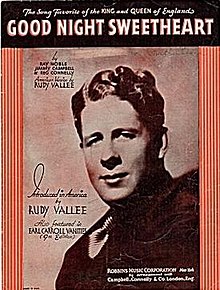Jump to content
Main menu
Navigation
●Main page
●Contents
●Current events
●Random article
●About Wikipedia
●Contact us
●Donate
Contribute
●Help
●Learn to edit
●Community portal
●Recent changes
●Upload file


Search
●Create account
●Log in
●Create account
● Log in
Pages for logged out editors learn more
●Contributions
●Talk
(Top)
1
References
2
External links
Goodnight Sweetheart (Ray Noble, Jimmy Campbell and Reg Connelly song)
Add links
●Article
●Talk
●Read
●Edit
●View history
Tools
Actions
●Read
●Edit
●View history
General
●What links here
●Related changes
●Upload file
●Special pages
●Permanent link
●Page information
●Cite this page
●Get shortened URL
●Download QR code
●Wikidata item
Print/export
●Download as PDF
●Printable version
Appearance
From Wikipedia, the free encyclopedia
 Sheet music cover featuring Rudy Vallée
Sheet music cover featuring Rudy Vallée
"Goodnight, Sweetheart" is a British popular song written in 1931. It has been performed by Al Bowlly, Kate Smith, Connie Francis (for her 1959 album My Thanks to You), Dick Haymes (for his Imagination album), Gordon MacRae (for his 1957 album Motion Picture Soundstage),[1] Sarah Vaughan (for her 1962 album Sarah + 2) and Dean Martin (for his 1958 album Sleep Warm), among others, and was the theme song for the 1990s BBC time-travel sitcom Goodnight Sweetheart starring Nicholas Lyndhurst, which was named after it.
"Goodnight, Sweetheart" was written in 1931 by the song-writing team of Ray Noble,[2] Jimmy Campbell[3] and Reg Connelly.[4]
It was recorded in 1931 by the Wayne King Orchestra (vocals by Ernie Birchill), Russ Columbo, Bing Crosby,[5] Ruth Etting and the Ray Noble Orchestra (vocals by Al Bowlly). Guy Lombardo also recorded his own version of the song in 1931 with vocals by Carmen Lombardo. Lombardo's version remained at No. 1 for a number of weeks in the U.S. charts.[6]
In film, the song was performed in Angel's Holiday with Jane Withers (1937),The Palm Beach Story (1942; performed by Rudy Vallée), Stage Door Canteen (1943; sung by Kenny Baker), and Holiday in Mexico (1946; excerpt sung by Walter Pidgeon and Jane Powell).[7] It was also featured in the Star Trek episode "The City on the Edge of Forever".
On television, a version by Nick Curtis was used as the theme tune for the 1990s sitcom of the same name, Goodnight Sweetheart.
References[edit]
^ Jimmy Campbell (lyricist) on the Internet Movie Database
^ Copyright for Goodnight, Sweetheart
^ "A Bing Crosby Discography". BING magazine. International Club Crosby. Retrieved April 24, 2017.
^ William Ruhlmann, 'Breaking Records: 100 Years of Hits' Routledge (2004) ISBN 0-415-94305-1
^ Classic Movie Musicals website
External links[edit]
t
e
Retrieved from "https://en.wikipedia.org/w/index.php?title=Goodnight_Sweetheart_(Ray_Noble,_Jimmy_Campbell_and_Reg_Connelly_song)&oldid=1185123204"
Categories:
●1931 songs
●Wayne King songs
●Songs written by Jimmy Campbell and Reg Connelly
●Songs written by Ray Noble
●Al Bowlly songs
●Guy Lombardo songs
●1930s song stubs
Hidden categories:
●Articles with hAudio microformats
●Articles with MusicBrainz work identifiers
●All stub articles
●This page was last edited on 14 November 2023, at 18:42 (UTC).
●Text is available under the Creative Commons Attribution-ShareAlike License 4.0;
additional terms may apply. By using this site, you agree to the Terms of Use and Privacy Policy. Wikipedia® is a registered trademark of the Wikimedia Foundation, Inc., a non-profit organization.
●Privacy policy
●About Wikipedia
●Disclaimers
●Contact Wikipedia
●Code of Conduct
●Developers
●Statistics
●Cookie statement
●Mobile view




